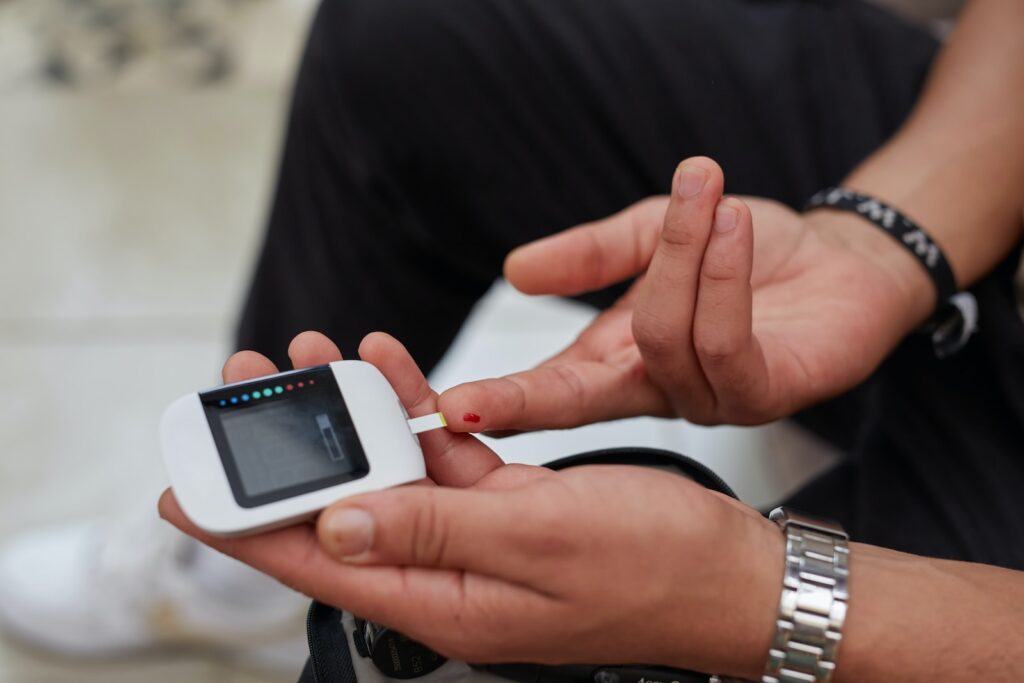Diabetes significantly increases your risk of oral health problems including gum disease, tooth loss, dry mouth, and infections due to high blood sugar levels that weaken your immune system and reduce saliva production.
At Lansdowne Family Dental, we help diabetic patients understand that with proper dental care, blood sugar management, and regular professional monitoring, you can maintain excellent oral health and prevent serious complications.
The connection between diabetes and oral health creates a two-way relationship where poor oral health can make blood sugar harder to control, while uncontrolled diabetes accelerates dental problems. Key oral health risks for diabetics include:
- Gum disease progression – High blood sugar feeds harmful bacteria and impairs healing
- Increased infection risk – Weakened immune response makes fighting oral bacteria difficult
- Dry mouth complications – Reduced saliva leads to higher cavity and infection rates
- Slower healing times – Delayed recovery from dental procedures and injuries
- Tooth loss potential – Advanced gum disease can result in permanent tooth damage
The intricate relationship between diabetes and dental health is often overlooked, yet understanding this connection is vital for anyone living with the condition. With the right knowledge, preventive strategies, and professional dental care, diabetics can successfully maintain healthy teeth and gums while supporting their overall diabetes management.
This comprehensive guide will explore essential dental tips, prevention strategies, and professional care recommendations specifically designed to help diabetics achieve optimal oral health.
Why Diabetics Are at Increased Risk
The elevated blood sugar levels in diabetics make them more susceptible to bacterial infections. The mouth, being a haven for bacteria, becomes a battleground. When diabetes is not well-managed, these bacteria thrive, leading to dental issues.

Common Dental Problems in Diabetics
- Gum Disease: Often the first sign of diabetes, gum disease can range from gingivitis to severe periodontitis.
- Dry Mouth: Reduced saliva production can cause dry mouth, leading to soreness, ulcers, and infections.
- Tooth Decay: With less saliva to wash away food particles, acids form and break down tooth enamel.
- Oral Fungal Infections: Diabetics are prone to fungal infections like thrush due to high glucose levels in their saliva.
- Delayed Healing: Any surgical procedures or even minor cuts in the mouth may take longer to heal for someone with diabetes.
7 Dental Care Tips for Diabetics
Being proactive is the key. Regular dental check-ups, combined with a stringent at-home oral care routine, can make a world of difference.
1. Daily Dental Care Rituals
- Brushing: Use a soft-bristled toothbrush and fluoride toothpaste. Brush at least twice daily.
- Flossing: Daily flossing removes food particles and reduces the risk of gum disease.
- Mouthwash: An antibacterial mouthwash can help in reducing bacteria and freshening breath.
2. Regular Dental Check-ups
- A bi-annual visit to the dentist is a must. These visits allow for early detection of potential problems and timely interventions.
3. Balancing Blood Sugar Levels
- Maintaining blood sugar levels within the recommended range is crucial. It not only benefits overall health but also keeps oral health issues at bay.
4. Staying Hydrated
- Drinking ample water ensures that the mouth remains moist, reducing the risk of dry mouth and its associated problems.
5. Avoiding Smoking
- Smoking exacerbates oral health problems. For diabetics, it’s even more detrimental. Quitting can significantly improve oral health.
6. Educating Yourself
- Being aware of the risks and understanding the signs of potential dental problems can lead to early detection and treatment.
7. Having A Diet
- A balanced diet, rich in calcium and vitamin D, can strengthen teeth and gums. Avoiding sugary snacks and beverages is also crucial.
For residents of Ashburn, Leesburg, Sterling, and Lansdowne, VA, choose Lansdowne Family Dental for quality dental care. We offer various dental services with a patient-centric approach. Start your dental journey with us. Contact us!
Living with Diabetes and Maintaining Oral Health
With the right knowledge and tools, diabetics can lead a life with minimal dental complications. It’s all about being vigilant, proactive, and prioritizing oral health.
FAQs
- How often should diabetics visit the dentist? Regular bi-annual check-ups are recommended. However, if any dental issues arise, immediate consultation is advised.
- Can diabetes lead to tooth loss? If not managed properly, diabetes can lead to severe gum diseases, which might result in tooth loss.
- Is it safe for diabetics to undergo dental surgeries? With proper blood sugar management and consultation with both the dentist and endocrinologist, dental surgeries can be safely performed.
- How can I prevent dry mouth caused by diabetes? Staying hydrated, using sugar-free gum, and avoiding caffeine can help in reducing the symptoms of dry mouth.
- Do diabetics need special toothpaste? While there’s no specific toothpaste for diabetics, using fluoride toothpaste is recommended.
- Are electric toothbrushes better for diabetics? Electric toothbrushes can provide a more thorough cleaning. However, the key is regular and proper brushing, regardless of the type of brush.
Take the Next Step
Your oral health is a window to your overall well-being, especially when living with diabetes. Prioritize your dental care, stay informed, and always seek expert advice when in doubt. Remember, a proactive approach today can save you from potential complications tomorrow.






